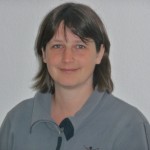Read along:
When you were a student did you like to go to school?
Yes, most of the time I liked it. I specially liked meeting my friends and my A-levels were English, German and History. I spent the first term of my year 11 in Nottingham, England. That was a great experience and I can only reccomend going aroad.
What was your worst subject as a pupil?
It was definitely Maths. I think mthe teachers of my sixth form course were at the brink of despair. There were mainly girls who constantly ignored the PEMDAS rule.
If you could create the ideal school what would it be like?
I think to have small classes in bigger classrooms with good equipments would make a difference. I also believe that extra activities – like student exchange programmes are very important for a school.
What’s your most effective way to punish pupils?
I don’t know – it depends on what the pupils has done. If a pupils keeps forgetting his / her homework calling the parents has proved to be quite effective. If a pupils misbehaves, I talk to him / her and if that doesn’t work I talk to the classteacher, the parents and maybe the headmaster. Fortunately, we don’t have to punish pupils very often.
What was your funniest moment as a teacher?
There are many funny moment I can’t recall a particular one.
There are moments that were not really funy when they happened, but when you talk about them later, you have to laugh. We went to Munich, for example and counted all pupils when we got onto the train. But when we got off the train in Munich, two girls were missing although all their things, including their shoes, were there. They arrived three hours later on socks because they had met some boys at the back of the train and that railway carriage was undocked in Frankfurt.
Sometimes pupils make funny mistakes, for example: “A panda eats, shoots and leaves.” or “I became a bike for my birthday.”
As time goes by, is teaching pretty much fun?
Yes, it is most of the time. There are stressful times but most of the time I really like it – it never gets boring. I couldn’t do a job were you do the same thing everyday.
What’s your connection to the school exchange programmes?
I am very much in favor for the programmes. We just went to Bambury in England and Buj in Hungary as part of our Comenius project and we want to start another Comenius project with a school in England.
The schools I worked for before also had exchange progammes and I helped organizing exchanges with schools in England and the USA.
As a pupil I took part in different exchange programmes myself and in our autumn break I am going to visit my exchange partner I met 24 (!) years ago on a town twinning exchange with England. We always hosted pupils from abroad and it was great to meet people from England, France, Southern Africa, Mexico, Turkey, … . I can only reccomend taking part in exchange programmes. With most of my host families and exchange partners I got on very well. But sometimes an exchange also helped me to value what I have at home.
Are school exchange programmes useful, what do you think?
Yes, very much. I think the school, the pupils and the parents all profit by these programmes.
Pupils improve their language skills and get to know a different culture. Exchange programmes are a great way to practise your English in a real context – instead of talking to your fellow pupils or your teacher, who can all speak perfect German (-that doesn’t really make sense, does it?). Exchange programmes motivate pupils to keep practising their language skills. Sometimes exchange partners become friends and visit each other again. It is also very interesting for pupils to get to know a different school system and a different culture.
What do you think, which are the advantages for this school/for Cuxhaven?
Having successful exchange programmes Italy and France it is our aim to find a school in a country where English is the native language. It would be a great enrichment for our school and Cuxhaven, specially since we introduced our bilingual profile.
Not only for pupils, but also for teachers it is very interesting to visit partner schools abroad. When we went to Banbury, for example, we learned how they organize their speaking tests in foreign languages. When we came home, we were told that we are supposed to do speaking test now as well. We can now profit from the experiences of our partner schools and ask them for help and advice.

